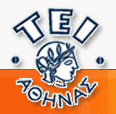JavaScript is disabled for your browser. Some features of this site may not work without it.
| dc.contributor.author | Poulopoulos, V. | en |
| dc.contributor.author | Vassilakis, C. | en |
| dc.contributor.author | Wallace, M. | en |
| dc.contributor.author | Antoniou, A. | en |
| dc.contributor.author | Lepouras, G. | en |
| dc.date.accessioned | 2019-02-17T06:18:14Z | |
| dc.date.available | 2019-02-17T06:18:14Z | |
| dc.date.issued | 2019-02-17 | |
| dc.identifier.uri | http://hdl.handle.net/11400/20242 | |
| dc.rights | Αναφορά Δημιουργού-Μη Εμπορική Χρήση-Όχι Παράγωγα Έργα 3.0 Ηνωμένες Πολιτείες | * |
| dc.rights.uri | http://creativecommons.org/licenses/by-nc-nd/3.0/us/ | * |
| dc.title | The effect of social media tending topics related to cultural venues’ content | en |
| heal.type | conferenceItem | |
| heal.identifier.secondary | https://ieeexplore.ieee.org/document/8501878/ | |
| heal.language | en | |
| heal.access | free | |
| heal.publicationDate | 2018 | |
| heal.bibliographicCitation | Poulopoulos, V., Vassilakis, C., Wallace, M., Antoniou, A., Lepouras, G. (2018). The effect of social media tending topics related to cultural venues’ content. SMAP 2018. | en |
| heal.abstract | Social media have gained the majority of attention on the Internet having an extreme number of daily visitors worldwide. The amount of information exchanged is vast, while users have become equally producers and consumers of data. Words like "trending", "influencers", "likes" and "viral" are in the daily agenda of data analyzers, as they are associated with factors that play an important role in the influence of social media content to its audience. These aspects are nowadays strongly taken into account by organizations that want to draw the public's attention to the content they deliver, and in this context cultural institutions have already started to take under great consideration not only their presence in social media, but also the monitoring and exploitation of social media dynamics. In this paper we propose a method that can enable cultural venues to benefit from matches between their own content and ongoing discussions on social media. More specifically we extract trending topics that can be related semantically with the content of a cultural institute and examine how a venue can benefit by exploiting these matches. The proposed approach has been developed in the scope of the "CrossCult" H2020 project, and has been experimentally tested by analyzing the case of Twitter in Greek language. | en |
| heal.sponsor | This publication is part of a project that has received funding from the European Union’s Horizon 2020 research and innovation programme under grant agreement No 693150 | en |
| heal.fullTextAvailability | false | |
| heal.conferenceName | 13th International Workshop on Semantic and Social Media Adaptation and Personalization (SMAP) | en |
| heal.conferenceItemType | full paper |
Αρχεία σε αυτό το τεκμήριο
| Αρχεία | Μέγεθος | Μορφότυπο | Προβολή |
|---|---|---|---|
|
Δεν υπάρχουν αρχεία που σχετίζονται με αυτό το τεκμήριο. |
|||
Οι παρακάτω άδειες σχετίζονται με αυτό το τεκμήριο:








